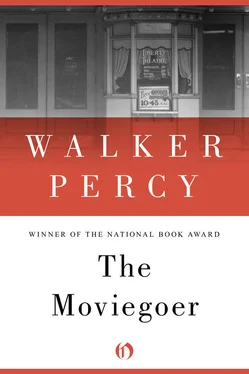Walker Percy - The Moviegoer
Здесь есть возможность читать онлайн «Walker Percy - The Moviegoer» весь текст электронной книги совершенно бесплатно (целиком полную версию без сокращений). В некоторых случаях можно слушать аудио, скачать через торрент в формате fb2 и присутствует краткое содержание. Год выпуска: 2011, Издательство: Open Road Media, Жанр: Современная проза, на английском языке. Описание произведения, (предисловие) а так же отзывы посетителей доступны на портале библиотеки ЛибКат.
- Название:The Moviegoer
- Автор:
- Издательство:Open Road Media
- Жанр:
- Год:2011
- ISBN:нет данных
- Рейтинг книги:5 / 5. Голосов: 1
-
Избранное:Добавить в избранное
- Отзывы:
-
Ваша оценка:
- 100
- 1
- 2
- 3
- 4
- 5
The Moviegoer: краткое содержание, описание и аннотация
Предлагаем к чтению аннотацию, описание, краткое содержание или предисловие (зависит от того, что написал сам автор книги «The Moviegoer»). Если вы не нашли необходимую информацию о книге — напишите в комментариях, мы постараемся отыскать её.
The Moviegoer — читать онлайн бесплатно полную книгу (весь текст) целиком
Ниже представлен текст книги, разбитый по страницам. Система сохранения места последней прочитанной страницы, позволяет с удобством читать онлайн бесплатно книгу «The Moviegoer», без необходимости каждый раз заново искать на чём Вы остановились. Поставьте закладку, и сможете в любой момент перейти на страницу, на которой закончили чтение.
Интервал:
Закладка:
My mother made up a cot in my corner of the porch. It is a good place, with the swamp all around and the piles stirring with every lap of water.
But, good as it is, my old place is used up (places get used up by rotatory and repetitive use) and when I awake, I awake in the grip of everydayness. Everydayness is the enemy. No search is possible. Perhaps there was a time when everydayness was not too strong and one could break its grip by brute strength. Now nothing breaks it — but disaster. Only once in my life was the grip of everydayness broken: when I lay bleeding in a ditch.
In a sudden rage and, as if I had been seized by a fit, I roll over and fall in a heap on the floor and lie shivering on the boards, worse off than the miserablest muskrat in the swamp. Nevertheless I vow: I’m a son of a bitch if I’ll be defeated by the everydayness.
(The everydayness is everywhere now, having begun in the cities and seeking out the remotest nooks and corners of the countryside, even the swamps.)
For minutes at a stretch I lie rigid as a stick and breathe the black exhalation of the swamp.
Neither my mother’s family nor my father’s family understand my search.
My mother’s family think I have lost my faith and they pray for me to recover it. I don’t know what they’re talking about. Other people, so I have read, are pious as children and later become skeptical (or, as they say on This I Believe: “in time I outgrew the creeds and dogmas of organized religion”). Not I. My unbelief was invincible from the beginning. I could never make head or tail of God. The proofs of God’s existence may have been true for all I know, but it didn’t make the slightest difference. If God himself had appeared to me, it would have changed nothing. In fact, I have only to hear the word God and a curtain comes down in my head.
My father’s family think that the world makes sense without God and that anyone but an idiot knows what the good life is and anyone but a scoundrel can lead it.
I don’t know what either of them are talking about. Really I can’t make head or tail of it. The best I can do is lie rigid as a stick under the cot, locked in a death grip with everydayness, sworn not to move a muscle until I advance another inch in my search. The swamp exhales beneath me and across the bayou a night bittern pumps away like a diesel. At last the iron grip relaxes and I pull my pants off the chair, fish out a notebook and scribble in the dark:
REMEMBER TOMORROW
Starting point for search:
It no longer avails to start with creatures and prove God.
Yet it is impossible to rule God out.
The only possible starting point: the strange fact of one’s own invincible apathy — that if the proofs were proved and God presented himself, nothing would be changed. Here is the strangest fact of all.
Abraham saw signs of God and believed. Now the only sign is that all the signs in the world make no difference. Is this God’s ironic revenge? But I am onto him.
Cheppity cheppity chep chep. Chep. Silence. Cheppity chep chep. Chep.
It starts as an evil turn of events. There is a sense of urgency. Something has to be done. Let us please do something about it. Then it is a color, a very bad color that needs tending to. Then a pain. But there is no use: it is a sound and it is out there in the world and nothing can be done about it. Awake.
Cheppity cheppity chep chep. Chep. Silence.
“Shtfire and save matches.”
Not ten feet below, two men try to start an outboard motor clamped to a handsome blue hull. The boat drifts into a miniature dock, knocks. The world is milk: sky, water, savannah. The thin etherlike water vaporizes; tendrils of fog gather like smoke; a white shaft lies straight as a ruler over the marsh.
“Why don’t you tighten up on your needle valve?”
“Why don’t you kiss my ass?”
The voices sound reedy and old in the wan white world. One of them must be my stepfather, Roy Smith. Yes, the helmsman. The green visor of his hat covers his face, all but a lip heavy with anger, but I recognize his arms. The muscle curves out far beyond the dimple of the elbow; his forearms are like little hams. Black-burnished hair sprouts through the links of his watchband. He sits embracing the red cowl of the motor, his abdomen strong and heavy between his legs.
Roy leans back, poises, pulls the rope with a short powerful chop. It catches with a throaty roar and this changes everything. The pleasant man in the bow is taken by surprise and knocked off balance as the boat skews against the dock. But now the boat seeks open water and the fishermen sit quickly about and settle themselves, their faces serene now and full of hope. Roy Smith is seen to be a cheerful florid man, heavy-set but still youngish. The water of the bayou boils up like tea and disgorges bubbles of smoke. The hull disappears into a white middle distance and the sound goes suddenly small as if the boat had run into cotton.
A deformed live oak emerges from the whiteness, stands up in the air, like a tree in a Chinese print. Minutes pass. An egret lets down on his light stiff wings and cocks one eye at the water. Behind me the screen door opens softly and my mother comes out on the dock with a casting rod. She props the rod against the rail, puts down a wax-paper bundle, scratches both arms under the sleeves and looks about her, yawning. “Hinh-honh,” she says in a yawn-sigh as wan and white as the morning. Her blouse is one of Roy’s army shirts and not much too big for her large breasts. She wears blue Keds and ladies’ denims with a flyless front pulled high over her bulky hips. With her baseball cap pressed down over her wiry hair she looks like the women you see fishing from highway bridges.
Mother undoes the bundle, takes out a scout knife and pries loose the frozen shrimp. She chops off neat pink cubes, slides them along the rail with her blade, stopping now and then to jiggle her nose and clear her throat with the old music. To make sure of having room, she goes out to the end of the dock, lays back her arm to measure, and casts in a big looping straight-arm swing, a clumsy yet practiced movement that ends with her wrist bent in, in a womanish angle. The reel sings and the lead sails far and wide with its gyrating shrimp and lands with hardly a splash in the light etherish water. Mother holds still for a second, listening intently as if she meant to learn what the fishes thought of it, and reels in slowly, twitching the rod from time to time.
I pull on my pants and walk out barefoot on the dock. The sun has cleared the savannah but it is still a cool milky world. Only the silvery wood is warm and raspy underfoot.
“Isn’t it mighty early for you!” Her voice is a tinkle over the water.
My mother is easy and affectionate with me. Now we may speak together. It is the early morning and our isolation in the great white marsh.
“Can I fix you some breakfast?”
“No’m. I’m not hungry.” Our voices go ringing around the empty room of the morning.
Still she puts me off. I am only doing a little fishing and it is like any other day, she as much as says to me, so let us not make anything remarkable out of it. She veers away from intimacy. I marvel at her sure instinct for the ordinary. But perhaps she knows what she is doing.
“I wish I had known you were going to get up so early,” she says indignantly. “You could have gone over to the Rigolets with Roy and Kinsey. The reds are running.”
“I saw them.”
“Why didn’t you go!”—in the ultimate measure of astonishment.
“You know I don’t like to fish.”
“I had another rod!”
“It’s just as well.”
“That’s true,” she says after a while. “You never did. You’re just like your father.” She gives me a swift look, which is unusual for her. “I noticed last night how much you favor him.” She casts again and again holds still.
Читать дальшеИнтервал:
Закладка:
Похожие книги на «The Moviegoer»
Представляем Вашему вниманию похожие книги на «The Moviegoer» списком для выбора. Мы отобрали схожую по названию и смыслу литературу в надежде предоставить читателям больше вариантов отыскать новые, интересные, ещё непрочитанные произведения.
Обсуждение, отзывы о книге «The Moviegoer» и просто собственные мнения читателей. Оставьте ваши комментарии, напишите, что Вы думаете о произведении, его смысле или главных героях. Укажите что конкретно понравилось, а что нет, и почему Вы так считаете.












